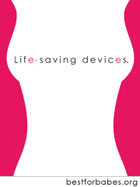Breastfeeding Controversy: Milk Sharing
Would you nurse another mom's baby? Read this before you make up your mind
By Stephanie Wood, Babytalk
When Amanda Stiebel's son, Cai, was 2 months old, she had a job interview an hour from home. Before heading out, she left Cai and some pumped breast milk with another new mom, her friend LaKeitha Simmons. But the interview ran late and hungry Cai polished off his bottle and howled for more. Since both moms were nursing exclusively, Simmons was unsure of what to do. Looking at the wailing baby, she decided to feed Cai some of her own expressed breast milk. "When I first learned about milk sharing, I thought it was weird, and it never occurred to me that I'd need to do it," she says. When Stiebel returned, she found herself surprised but grateful. "I knew LaKeitha's lifestyle, and we women have always worked together to raise our children," she notes. Sharing breast milk may sound kooky or unsavory to some, but it's a growing practice that can carry benefits or risks for a baby, depending on who's doing it -- and how. While casual arrangements like Stiebel's experience are a relatively new trend, milk banking -- donating screened expressed milk for at-risk babies, for whom breast milk's immunity-boosting components can be lifesaving -- has been around for more than 100 years and is on the rise. Banking gets a thumbs-up from experts because donating moms adhere to strict lifestyle guidelines (no smoking or drinking). The women also go through a screening process to ensure that no diseases, such as HIV or hepatitis, are passed to the infant.
Beyond the Bank
In addition to exchanging expressed breast milk, some moms skip the bottle and cross-nurse, splitting breastfeeding duties with another woman and her baby. Cross-nursers say they enjoy the flexibility as well as the four-way bonding that occurs between the moms and their children. And some moms go as far as hiring a wet nurse -- a woman paid to breastfeed another child -- when they can't perform the task themselves. Informal sharing is naturally more controversial, but a significant number of moms are open to the idea. According to a nationally representative Babytalk survey on momconnection.com, 40 percent had either a positive response ("beautiful!") or a neutral reaction ("each to her own") when asked how they felt about milk sharing.
Yet the majority of the medical community warns against it. "We support breastfeeding, but if you can't nurse, we recommend breast milk from a milk bank, or that you use formula," says Ari Brown, M.D., a spokesperson for the American Academy of Pediatrics and author of Baby 411. "Even if you have a good friend who wants to donate milk, you can't guarantee that it's free of infections, like HIV. Breast milk is a bodily fluid, just like blood. Would you be willing to give your baby a blood transfusion without first having it tested?"
Bosom Buddies
Why, then, do women potentially risk their little ones' well-being by engaging in informal milk sharing? For starters, the word is out that breast is best: Almost 75 percent of new moms leave the hospital breastfeeding their newborns, and some women are wedded to providing breast milk, even if it's not their own. There's also the issue of supply and demand. A doctor's prescription is required to purchase banked milk, so most of the precious fluid goes to babies with medical needs -- it's not always available to moms with low milk production or adoptive families. Then there's the whopping price tag: Milk banks charge as much as $5 an ounce, and while some insurance plans will cover a percentage of the cost, others don't.
Christin Lewin of Columbia, Maryland, knows all too well how the desire to nurse can become obsessive. Due to a car accident in which she suffered massive internal injuries, Lewin thought she would never be able to have a baby, let alone breastfeed. Fast-forward five years: Lewin did indeed conceive and deliver a daughter, Keira. "I told myself that I would try to breastfeed to give her the best start, even if I could only produce a tiny amount," recalls Lewin. "But Keira became jaundiced and dehydrated because my milk wasn't coming in. I was devastated, so my midwife suggested I look into donor milk from another mom."
Lewin turned to MilkShare, an online resource that connects milk-needy moms with donors. Unlike formal milk banks, MilkShare recommends but doesn't require screening -- so it's up to you to decide if you trust a mother's lifestyle or if you want her to undertake, at your expense, the blood work necessary to deem the milk disease-free. The upside: The milk is free of charge. MilkShare specifically discourages selling breast milk because it could tempt some donors to dilute their milk to increase profits.
Lewin posted her SOS on the site and received a response from Michele Leiberman, a neighbor with a son, Bryce, about Keira's age. Leiberman had been donating to the National Milk Bank, which meant she had passed its extensive screening tests.
The two moms met, Leiberman provided Lewin with her medical tests, and she began pumping extra milk after she'd fed Bryce. "It's been terrific," says Leiberman. "I love the reward of holding the baby I'm helping. It's much better than being an anonymous donor."
Not all doctors are against informal sharing. Pediatrician and Babytalk contributing editor William Sears, M.D., feels the superiority of breast milk is worth breaking the rules for. "This is not a back-to-nature, hippie-type movement," he insists. "It's what savvy moms who know the science are doing to ensure that their baby is getting the best." This father of eight solicited donor milk himself through the moms in his pediatric practice for an adopted daughter. "When our daughter Lauren arrived, all I could think was, 'She shouldn't be deprived of breast milk just because she's adopted,'" he recalls. Dr. Sears and his wife were no strangers to milk sharing. Prior to Lauren, Martha Sears had occasionally cross-nursed another daughter, Erin, with a mom friend and her son.
Milk sharing wisely means not only knowing the donor mom's health status but also closely matching donor milk to your baby's age. " A mother's milk is specific for her baby and changes as the baby grows," explains Karen Zeretzke, a New Orleans–based spokesperson for La Leche League International, an organization that promotes breastfeeding and supports regulated milk banks but cautions against informal sharing. "Donor milk may also pass along viruses, which a baby can't fight because he hasn't received that mother's antibodies."
The Other Side of the Nursing Bra
Moms who engage in cross-nursing relish the bonding -- yet this intimacy is why other moms find it a turnoff. In our survey, 45 percent of women said the practice was "disgusting" or "weird," and it bothered them most because "nursing isn't just about nutrition." Thirty six percent said it was a personal experience they wouldn't want to share. "My first reaction is eww! And I'm a breastfeeding advocate," says Erin Acosta of Orange, California. "Barring illness, I can't see myself being okay with it."
While milk sharing is likely to remain controversial, the moms who do it feel doubly rewarded. In fact, a recent study in the Journal of Human Lactation found that moms donate milk because their cups runneth over and they want to help other mothers. Says Stiebel, who would share milk again if the need arose, "Moms are moms to everyone's children."
Share Safely
- Donate to a bank
If you want to gift your milk, contact the Human Milk Banking Association of North America (hmbana.org) to find a milk bank near you. You and your milk will be screened to ensure safe sharing.
- Insist on testing
If you can't get a prescription for a regulated milk bank, you can find donors at milkshare.com. Be sure the donor lives healthfully and is tested for HIV, hepatitis, herpes, syphilis, tuberculosis, cytomegalovirus, strep, and staph. Never buy milk online -- you can't know if it's safe.
Compare birthdays
When milk sharing, remember that a mom's milk changes over time to match her baby's needs, so it will be best for infants close in age.
Stephanie Wood is the executive editor of Babytalk and a mother of three.
Breastfeeding Controversy: Milk Sharing - Parenting.com (Page 1)
Subscribe to:
Post Comments (Atom)





















No comments:
Post a Comment